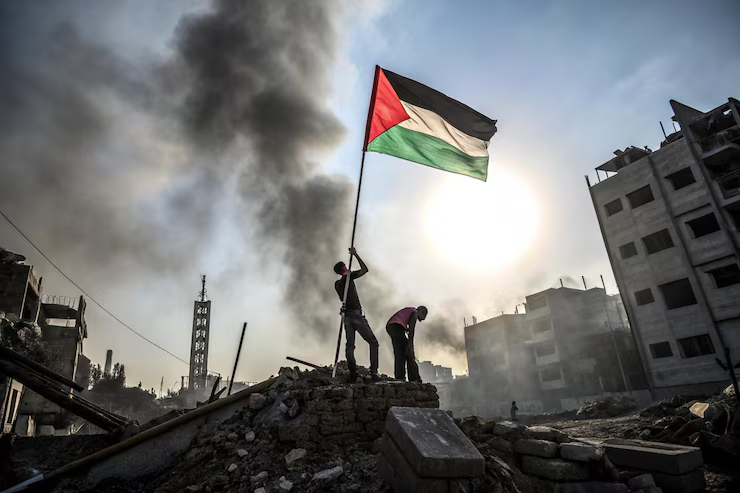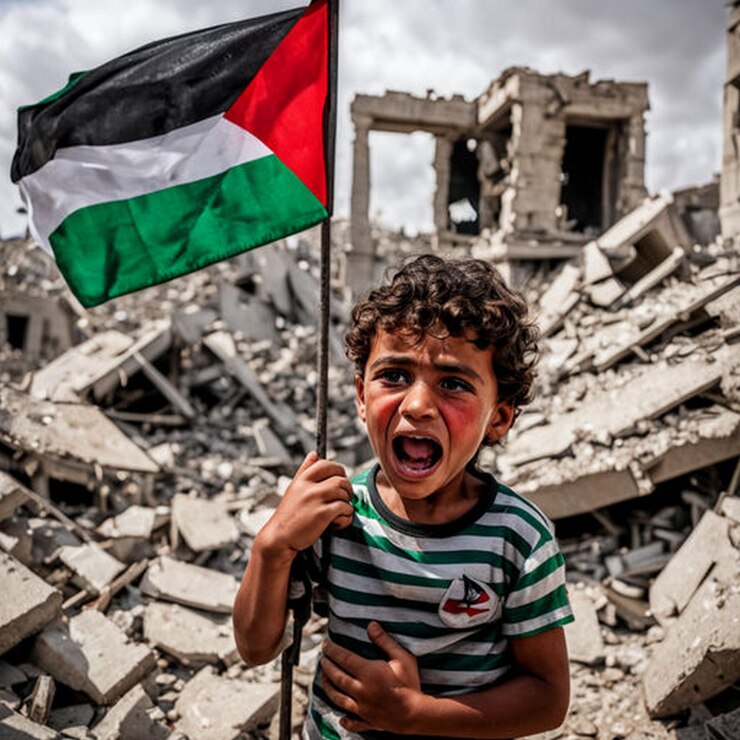Global leaders addressing the ongoing conflict have taken several steps. They spoke out at meetings. They issued statements. They used trade tools. And they pressed for aid. This post looks at what they have done. It uses simple words. It sticks to facts. And it shows why these actions matter for people on both sides.
United States calls for end to fighting
First, the United States stood firm. In mid‐May, President Biden urged Israel to let in aid and to curb attacks on civilians. Then on May 19, top US diplomats joined a joint statement with France and Canada. They said Israel must stop its military moves in Gaza. And they said cities and shelters must stay safe. They also said the world will watch how Israel treats people in Gaza.
Next, US envoy Brett McGurk met with leaders in Doha. He pressed for a quick deal on hostages. He also said that a lasting peace will need talks on giving Palestine state rights. He said the US will back any fair deal. And he vowed to keep pushing all sides to the table.
United Kingdom shifts tone and action
Then, the United Kingdom made a sharp turn. On May 21, Foreign Secretary David Lammy called Israel’s aid block in Gaza “abhorrent” and “unacceptable.” He said he could not stay silent as children went hungry. Next, he halted free trade talks with Israel until the aid flow fixed. He warned that more steps would follow if aid did not reach Gaza.
Also, Prime Minister Keir Starmer backed a plan to let Palestinians vote at the UN. He said this could help stop the war. He asked other leaders to talk about Palestinian statehood at the G7 in June. And he told his team to weigh new measures if Israel kept blocking aid.
European Union debates stronger measures

Meanwhile, parts of the European Union pressed for tougher steps. On May 22, France, Spain, and Belgium led a push to review the EU-Israel deal. They said Israel broke key rules on war and human rights. They asked the EU to pause the deal until Israel eased the siege.
But Germany and Italy held back. They worry that cutting ties could hurt peace talks. They also fear a split in the EU. So the matter went to a special meeting in Brussels. Leaders said they will talk more before any vote. And they plan to watch Israel’s moves in the next weeks.
United Nations presses for human aid
At the United Nations, the scene was dire. On May 21, the UN press office said 80 percent of Gaza falls in hard zones. Aid workers must ask permission to move. Hospitals struggle with no power. And blood runs short for wounded people.
So UN Secretary-General António Guterres called an emergency session. He asked the UN Security Council to pass a resolution. He wanted a safe passage for aid, plus a ceasefire. He also urged all members to back more UN teams on the ground.
G7 and global finance link
Next, Group of Seven (G7) leaders met in Japan. They put the Israel-Gaza crisis on top of the agenda. They agreed to urge Israel to open all crossings for help. They also said they will track any deal on Palestinian voting rights. And they said the G7 might use financial tools if the aid block stays.
In addition, the UN’s World Bank and IMF spoke up. They warned that Gaza’s economy could collapse. They said that without imports, prices for food and medicine will skyrocket. They offered to set up an aid fund. And they asked G7 states to chip in billions so Gaza can rebuild.
Regional actors push for ceasefire
Also, regional powers took action. Egypt’s President Abdel Fattah el-Sisi backed the latest ceasefire deal on January 19, 2025. He said the crossing at Rafah must stay open for aid. And he vowed to keep pushing both sides for peace.
Qatar’s prime minister called the ceasefire a start. He said it must lead to a fair talk on borders and rights. And he thanked the UN and US envoys for their work. He said new talks should aim for a plan that both sides can live with.
Saudi Arabia cheered the deal too. Its foreign office said it values Egypt and Qatar’s help. It also said a real peace needs a Palestinian state with East Jerusalem as capital. And it backed any UN plan to that end.
Humanitarian groups and joint donors
At the same time, donor states spoke out. On May 19, France and others said Israel has blocked aid for more than two months. They warned of mass hunger. They asked Israel to let food and medicine in now.
Canada, Japan, and the EU have set up a joint fund. They will channel money to groups on the ground. They aim to buy local supplies. And they said they will send teams to watch the aid flow. They will report any block or delay.
Challenges and outlook
But big issues remain. Israel fears aid trucks could sneak weapons to Hamas. So it checks every load. And it worries that moves on Palestinian statehood could harm its security.
On the other side, Palestinians suffer in camps with no clean water. They watch the world talk but see no end. They doubt that any deal will help families rebuild.
Yet leaders still meet. And they still talk of peace. They still use meetings like G7, UN, and Arab summits to press the case. They still push for more aid and safer zones for civilians.
Why these steps matter
And that is why global leaders addressing the ongoing conflict can help. First, talk shapes what will happen next. If leaders agree on statehood or aid, they set the stage. Next, new aid funds can keep people alive. And new trade steps can pressure for calm.
Moreover, these moves show the world cares. They give hope to people who face bombs and hunger. And they set a path for real talks on peace, land, and rights.
Conclusion
Global leaders addressing the ongoing conflict act on many fronts. They use speeches, statements, and trade tools. They meet at G7, the UN, and EU halls. They press for more aid and safe zones. And they urge fair talks on statehood. While big gaps remain, every step can save lives and build trust. And that can lead to a lasting peace that both sides deserve.

